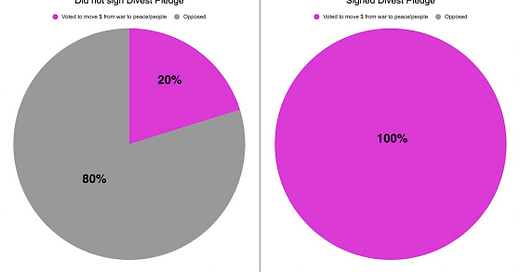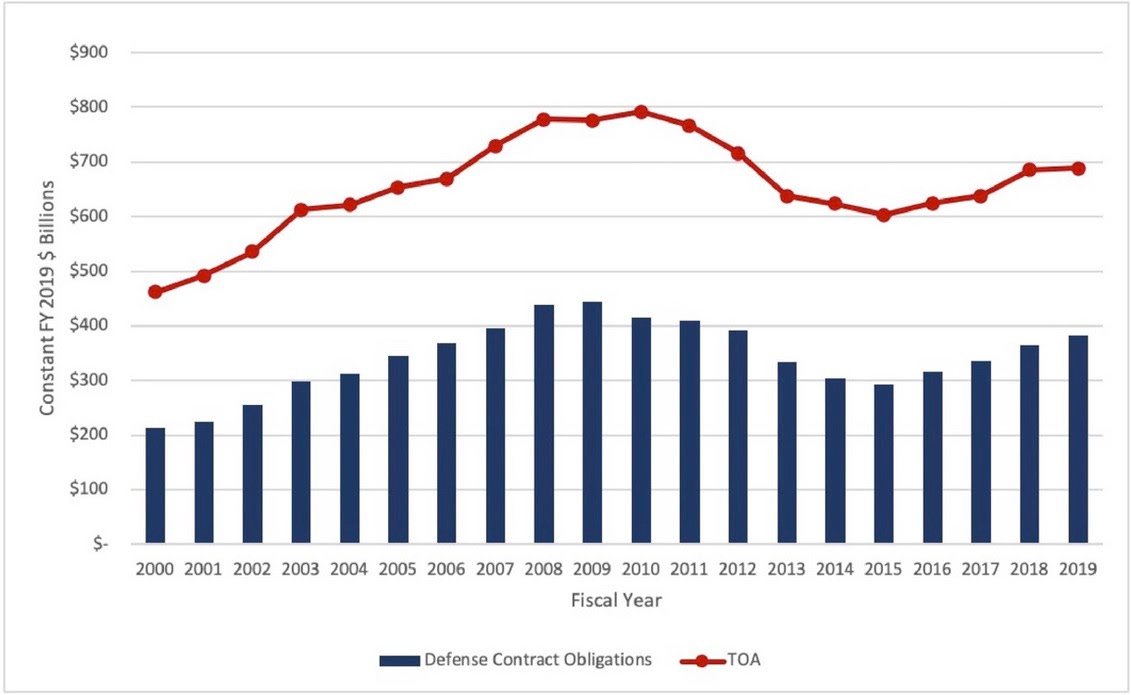A pathway for confronting militarism and corruption in Congress
Speaking Security Newsletter | Advisory Note for Organizers and Candidates, n°70 | 3 March 2021
The tip jar for this newsletter is here; and please follow SPRI. Also: I do consulting. Reply to this note if interested. Thank you!
Situation
The House votes later today on H.R. 1, the For the People Act. Despite some good amendments being omitted, the bill still includes provisions related to mail-in voting, slowing the revolving door, improving transparency, curtailing gerrymandering, among other things.
But for all the productive stuff it does, curtailing the undue influence of military contractors doesn’t appear to be one of them. Subtitle H in H.R. 1 relates to political contributions by these corporations, but it’s limited to a (contingent) disclosure requirement.
So it won’t resolve the central issue at play: Donations* from military contractors steer congressional votes on increasing the Pentagon budget, and size of the Pentagon budget correlates with the value of contracts DOD awards to the private sector (a vicious circle):
^via CSIS. “TOA” (the red line) stands for total obligation authority, or how much money Congress authorizes DOD to spend in a given year. The blue bars indicate how much cash DOD gave to the private sector.
* $15.5 million and $15.7 million to Republican and Democrat congressional candidates, respectively, from 2019-20 according to the Center for Responsive Politics.
Proposal
Codepink has an advocacy model to confront this problem that looks promising so I decided to evaluate it. It’s about getting politicians to sign on to the organization’s divestment pledge, which is a commitment to refuse campaign contributions over $200 from the top five military contractors. Here are the current congressional signatories:
Yvette Clarke (NY-9)
Jim McGovern (MA-2)
Raul Grijalva (AZ-3)
Pramila Jayapal (WA-7)
Ro Khanna (CA-17)
Barbara Lee (CA-13)
Eleanor Holmes Norton (DC)
Jan Schakowsky (IL-9)
Maxine Waters (CA-43)
Bonnie Watson Coleman (NJ-12)
Nydia Velazquez (NY-7)
Evaluation
1. Do signatories take less war industry cash than their peers?
Yes.
Data via Open Secrets. This chart factors in campaign/PAC contributions from all military contractors, and not just the top five, per the pledge. But considering that about half of all war industry contributions come from these five corporations (out of about 50,000 military contractors), I don’t think I’m misleading anyone with the ratio between signatories and non-signatories depicted above regarding industry cash received. That ratio is nearly 12:1, by the way.
2. Do signatories perform better than their peers?
Yes.
I looked at the votes on last year’s amendment that would have rerouted ~$74 billion from the Pentagon to social programs. Because DC is denied political agency/votes on military spending, for Rep. Norton I subbed in former-Rep. Tulsi Gabbard, who was also a congressional signatory.
All 11 signatories supported moving funds from the Pentagon to the people. There were 406 other members who voted on the amendment; 82 (20 percent) voted for it, 324 (80 percent) voted against it.
Conclusion
There are many people who should be signatories to the divest pledge who are not. But as far as a framework goes, this holds enormous potential. Not just for forming congressional coalitions to defund the Pentagon or address defense sector corruption via campaign finance reform, but to draw public attention to a major problem: the more a member of Congress accepts from military contractors, the more likely it is that they’ll disregard public opinion with their votes.
Thanks for your time,
Stephen (@stephensemler; stephen@securityreform.org)
Find this note useful? Please consider becoming a supporter of SPRI. Unlike establishment think tanks, we rely exclusively on small donations.





